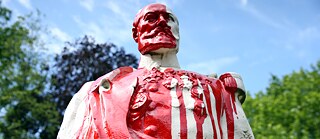Colonial traces in the public space
And the statues really are alive

What should we do with colonial monuments and traces in the public space? Ever since the murder of George Floyd and the subsequent worldwide demonstrations in the context of the Black Lives Matter movement, the discussion about historic monuments has been rekindled. The attack on statues that honour colonial rulers with no regard to their violent past has led to vandalism and removal of monuments in cities including Antwerp, Bristol and Boston.
By Jana J. Haeckel
The monuments are a homage to hatred, not to heritage, is the frequent accusation. What conceivable strategies are there beyond the iconoclastic act of destroying the images? Affixing information plaques? Providing an antithesis in the form of artistic adaptation? Or would regular guided tours in cooperation with diaspora experts be enough to offer some insight into the brutal historical ramifications?
These urgent issues were discussed in the third workshop of the project Everything passes except the past at the Museu Etnològic i de Cultures del Món in Barcelona.
From 23rd to 25th October 2019, activists, historians, politicians, artists and museum experts from Africa, Latin America and Europe debated on European colonial history and its consequences – a subject still largely marginalised today.
“Everything you do for me without me is against me” was one of the key concepts at the centre of many substantive discussions about inclusion and exclusion. One conclusion reached here by the participants was that European institutions are reaching their limits as knowledge producers, and it is only possible to deliver a sustainable re-evaluation and re-interpretation of the colonial discourse through long-term involvement of the diaspora communities in a structural capacity. Furthermore, alternative knowledge production practices were proposed, such as grass roots activities that facilitate projects relating to history, art and knowledge and encompass the marginalised residential districts and youth centres.
A public intervention by performance artist and activist Linda Pornsanchez created a huge sensation at rush hour in front of what must be Catalonia’s most significant monument: the Columbus Column. For her intersectional feminist performance Linda Pornsanchez read out her manifesto with breasts bared, wearing an indigenous costume and standing before a reproduction of a historical drawing depicting the brutal tyranny of Columbus. Her impressive appeal accused the so-called “discoverer of America” of violent conduct towards the indigenous inhabitants of America, which contributed significantly towards the transatlantic slave trade and required the acceptance and visualisation of (neo-)colonial violence. From the baffled, in some cases amused reactions of the tourists who had involuntarily become spectators, it became apparent how much educational input is still needed with regard to colonial history.
Workshop participants:
- Silvia Albert Sopale, actress and script advisor
- Tania Adam, journalist
- Andres Antebi, anthropologist and curator
- Kokou Azamede, historian
- Laida Azkona Goñi, artist
- Karfa Diallo, journalist and activist Memoire & Partages
- Sally Fenaux, film-maker
- Duane Jethro, research fellow
- Hannimari Jokinen, artist and activist Hamburg Postkolonial
- Yann Le Gall, activist and research fellow Berlin Postkolonial
- Billy Kalonji, activist and education provider
- Grace Ndiritu, artist
- Gustau Nerín, historian and curator
- Justo Aliounedine Nguema Pouye, activist
- Gala Pin, politician
- Mnyaka Sururu Mboro, activist, Berlin Postkolonial
- Txalo Toloza, artist
- Oriol Pascual, assistant director Museu Etnològic i de Cultures del Món
- Linda Pornsanchez, artist and activist